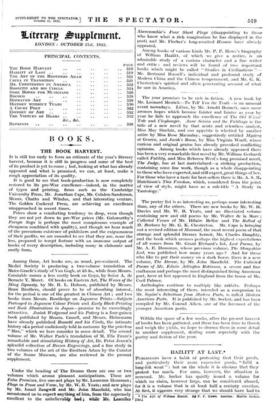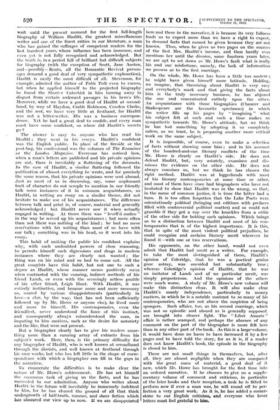HAZLITT AT LAST.* PUBLISHERS have a habit of protesting that
their goods, and particularly their more expensive goods, " fulfil a long-felt want " : but on the whole it is obvious that they protest too much. For once, however, the situation is reversed. Mr. Seeker has quietly issued a volume for which no claim, however large, can be considered absurd, for it is a volume that is at least half a century . overdue. At first, it alipears very strange that we should have had to.
The Life of William liaziitt. Ha P. 1'. lioare.. Landon: Martin Seeker. 12484
wait until the present moment for the first full-length biography of William Hazlitt, the greatest miscellaneous writer and one of the finest critics in our literature, a man who has gained the suffrages of competent readers for the last hundred years, whose influence has been immense, and even yet is not fully recognized and acknowledged. But the truth is, in a period full of brilliant but difficult subjects for biography (with the exception of Scott, Jane Austen, and—possibly—Keats, all the Romantic Revival person- ages demand a good deal of very sympathetic explanation), liazlitt is easily the most difficult of all. Stevenson, for
example, admired the author of Table Talk even to excess,
but when he applied himself to the projected biography he found the Shorter Catechist in him turning away in disgust from certain awkward passages in his hero's life.
Moreover, while we have a good deal of Hazlitt at second- hand, by way of Haydort, Crabb Robinson, Cowden Clarke, and the rest, we have very little at firsthand, for Hazlitt was not a letter-writer. His was a business correspon- dence. Yet he had a great deal to confide, and every man must have sonic confidant, so where did Hazlitt's secrets go ?
The answer is easy to anyone who has read his Hazlitt ; they went in his essays. Hazlitt's confidant was the English public. In place of the fireside or the
post-bag, his confessional was the columns of The Examiner or the London Magazine. Everyone has noticed how, when a man's letters are published and his private opinions
are out, there is inevitably a fluttering of the dovecots. In the case of Hazlitt, a similar fluttering followed the publication of almost everything he wrote, and for precisely the same reason, that his private opinions were sent abroad. Just as most of us in discussing, say, some unpleasant trait of character do not scruple to mention in our friendly talk some instances of it in common acquaintances, so Hazlitt, in writing an essay on a similar theme, did not hesitate to make use of his acquaintances. The difference between talk and print is, of course, material and generally acknowledged ; but Hazlitt never saw it when actually engaged in writing. At times there was " levell'd malice " in the way he served up his acquaintances ; but more often than not there was nothing of the kind ; he had no more reservations with his writing than most of us have with our talk ; something was in his head, so it went into his essay.
This habit of making the public his confidant explains why, with such undoubted powers of close reasoning, he permits himself such digressions and drags in modern instances where they are clearly not wanted ; the thing was on his mind and so had to come out. All the great essayists have this habit, but not one to such a degree as Hazlitt, whose manner seems positively naive when contrasted with the cunning, indirect methods of his friend Lamb, or even with the seemingly artless prattle of his other friend, Leigh Hunt. With Hazlitt, it was entirely instinctive, and became more and more necessary as, soured by various disappointments (particularly in love—a clue, by the way, that has not been sufficiently followed up by Mr. Howe or anyone else), he lived more and more to himself. His contemporaries, even the friendliest, never understood the force of this instinct, and consequently always misunderstood the man, in imputing to him motives, such as the desire for notoriety and the like, that were not present.
But a biographer clearly has to give his readers some- thing more than a cunning array of extracts from his subject's work. Here, then, is the primary difficulty for any biographer of Hazlitt, who is well known at secondhand through the diarists, and well known at firsthand through his own works, but who has left little in the shape of corre- spondence with which a biographer can fill in the gaps in the narrative.
To enumerate the difficulties is to make clear the nature of Mr. Howe's achievement. He has set himself the enormous task of giving us the facts, and he has succeeded to our admiration. Anyone who writes about Hazlitt in the future will inevitably be immensely indebted to him, for he has cleared the ground of all that thick undergrowth of half-truth, rumour, and sheer fiction which has obscured our view up to now. If we are disappointed
here and there in the narrative, it is because its very fullness leads us to expect more than we have a right to expect, to demand facts that cannot be given because they are not known. Thus, when he gives us two pages on the sources of the first Mrs. Hazlitt's income, and then hardly ever mentions her until the divorce, some fourteen years later, we are apt to set down as Mr. Howe's fault what is really his and our misfortune, namely, the lack of information we possess as to the first marriage.
On the whole, Mr. Howe has been a little too austere ; he might have given himself more latitude. Holding, we imagine, that theorizing about Hazlitt is very easy and everybody's mark and that giving the facts about him is the truly necessary business, he has abjured the one and concentrated entirely upon the other. An acquaintance with those biographies (Chaucer and Shakespeare are the favourite specimens) in which the writer fills up his pages by " imagining " what his subject felt at such and such a time makes us sympathetic towards Mr. Howe's attitude, but we think he has lost something by adopting it so completely unless, as we trust, he is preparing another more critical work on the same subject.
It is impossible, of course, even to make a selection of facts without showing some bias ; and in his account of the hundred-and-one literary conflicts of the time Mr. Howe is clearly on Hazlitt's side. He does not defend Hazlitt, but, very astutely, examines and dis- misses the evidence on the other side. He does not always convince us, but we think he has chosen the right method. Hazlitt was at loggerheads with most of his literary contemporaries at some time or other, and most of them have since had biographers who have not hesitated to show that Hazlitt was in the wrong, so that, in the name of common justice, it is time the latter had a turn. It is too often forgotten that the Lake Poets were ostentatiously political (bringing out editions with prefaces filled with controversial political matter) and so could not grumble if they got a rap over the knuckles from a critic of the other side for holding such opinions. Which brings us to a distinction between Hazlitt and most of his con- temporaries that is of the highest importance. It is this, that in spite of the most violent political prejudices, he could recognise and acclaim literary merit wherever he found it—with one or two reservations.
His opponents, on the other hand, would not even admit that Hazlitt had merit as a writer. For example, to take the most distinguished of them, Hazlitt's opinion of Coleridge, that he was a poetical genius gone astray, was onesidcd but substantially true ; whereas Coleridge's opinion of Hazlitt, that he was an imitator of Lamb and of no particular merit, was simply preposterous. And the opinions of the others were much worse. A study of Mr. Howe's new volume will make this distinction clear. It will also make clear Hazlitt's manly independence, particularly in- money matters, in which he is a notable contrast to so many of his contemporaries, who are not above the suspicion of being spongers. Such affairs, too, as his second marriage, which was not so episodic and absurd as is generally supposed, are brought into clearer light. The " Liber Amoris " affair is rather scamped, and perhaps the absence of any comment on the part of the biographer is more felt here than in any other part of the book. As this is a large'volume, it would have done no harm- to have increased it by a few pages and to have told the story, for as it is, if a reader does not know Hazlitt's book, the episode in the biography is closed to him.
These are not small things in themselves, but, after all, they are almost negligible when they are compared with the great mass of material, a good deal of it new, which Mr. Howe has brought for the first time into an ordered narrative. If he chooses to give us a supple- mentary volume of comment and criticism, in particular of the later books and their reception, a task he is fitted to perform now if ever a man was, he will round off to per- fection a very great work. As it is, he has added a corner- stone to our English criticism, and everyone who loves letters must feel grateful to him.



































































 Previous page
Previous page